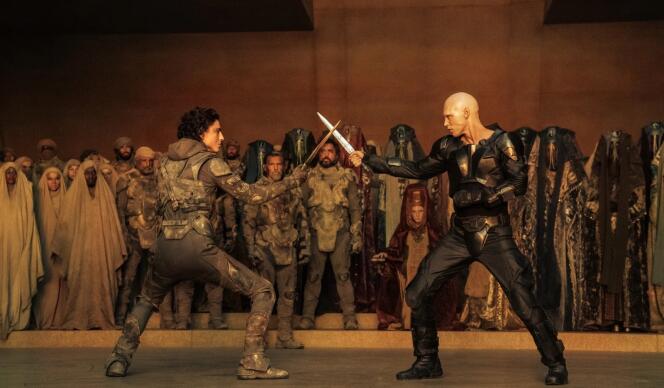


LE MONDE'S OPINION: WHY NOT?
Twenty-nine months after the release of the first installment, the new-generation Dune saga continues, taking the story initiated by Frank Herbert in 1965 one step further. Long considered an insurmountable Everest, the famous science-fiction novel has given generations of adapters a hard time, starting with David Lynch, who delivered a version in 1984 that is remembered as a splendid shipwreck.
This time, Canadian director Denis Villeneuve is in charge. In the 20 years since his first films in Quebec, he has climbed the ladder to the Hollywood citadel. And now to the Olympus of blockbusters, thanks to his sensational auteur credentials. Having laid the foundations of the Dune mythology in the first film in 2021, Villeneuve now has to keep its universe moving at a cruising speed.
The first installment featured two dynasties battling for possession of the planet Arrakis, where the precious spice is harvested. This strategic resource in the galactic system enables leaps of consciousness and space travel. When the second opens, the Atreides, defeated and reduced to nothing, have been ousted from their rightful throne by the Harkonnen, a brutal, fascistoid regime led by a repulsive baron (Stellan Skarsgård) named – brace yourself – Vladimir! But Vladimir doesn't yet control the whole territory. Paul (Timothée Chalamet), heir to the fallen house, and his mother, Lady Jessica (Rebecca Ferguson), have just joined the Fremen, the indigenous, troglodyte and rebellious people living in the vast desert regions of the star, who are leading resistance action against the powers that be.
This second installment focuses on Paul's difficult integration among these desert guerillas. He gradually gains their trust through his feats of strength and other trials, such as riding the giant worms that crisscross the dunes. In particular, he wins the esteem, then the heart, of the fighter Chani (Zendaya), with whom he can see himself trading his warrior destinies. But Stilgar (Javier Bardem), a Bedouin-inspired chief, sees the stranger's presence as the perfect opportunity to revitalize the dying Fremen dynasty by creating a new prophet from scratch. He urges his people to believe that Paul is the chosen one.
We're witnessing the creation of a messiah, which must be matched by the counter-advent of an antichrist of equal stature. This is provided by a degenerate, psychotic Harkonnen nephew: The disturbing Feyd-Rautha is championed for his savagery and given a sickly erotic edge by a bald Austin Butler.
You have 49.85% of this article left to read. The rest is for subscribers only.
